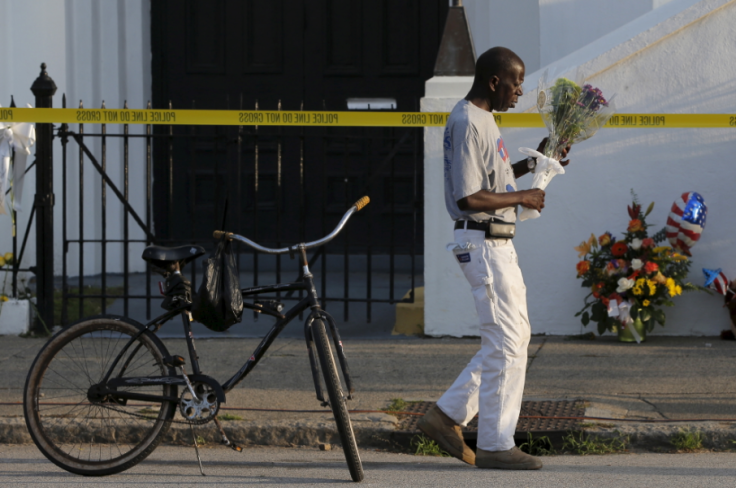Charleston Shooting Suspect: Don Lemon Calls Dylann Roof A Terrorist; 'Uncle Tom' Heckler Video Evidence

The murders of 9 black people at the historically black Emanuel African Methodist Episcopal (AME) Church in Charleston, South Carolina on Wednesday was announced by the killer himself, Dylann Roof, as racially motivated. But is it terrorism?
Although his fatal shooting spree fits the official criteria for terrorism, most mainstream media coverage of the Charleston shootings balked at calling it that, corralling that discussion instead to op-ed pieces written by experts.
CNN reporter Don Lemon, who was named by the Columbia Journalism Review as one of 2014's worst journalists and is often derided as racially insensitive when covering civil rights issues, might in fact be the only journalist who used the word unequivocally on Thursday to describe Roof's act. But he might have had some prompting by a very angry heckler.
In a video that went viral on Thursday, a black heckler interrupts CNN coverage to protest media handling of the Charleston shooting. “Black people are angry. It is not a hate crime, it is a terrorist attack. White people are terrorists!” the woman yells as CNN’s John Berman talks to Lemon near the Emanuel AME church in Charleston, S.C.
As Berman and Lemon try to ignore her, she continues her questions, asking “Don, are you angry? Are you angry, Don? Uncle Tom, hello?”
Her "Uncle Tom" epithet against Lemon refers to a character in Harriet Beecher Stowe's 1852 novel, "Uncle Tom's Cabin," and is now used colloquially as an insult to describe a black person who is perceived to be subservient to whites or who seems to adhere to ideologies that blame or oppress black people.
"You can understand why people are upset," Lemon says. "This shouldn't happen to anyone. The whole thing we've been talking about -- is this terrorism or not -- I think it is terrorism. By any stretch of the imagination."
Sylvia Johnson, a cousin of shooting victim Clementa Pinckney, a U.S. State Senator and pastor, said that one of the survivors told her Roof said before he began to shoot, "I have to do it. You rape our women and you're taking over our country. And you have to go." And interviews with his roommate indicate that he'd been planning the shooting for months, allegedly claiming that he wanted to start a "race war."
But some news organizations, Fox News being the most egregious example, did not categorize racially-motivated mass shooting as a hate crime or as domestic terrorism. A Fox pundit called it a "war on Christianity." Nothing was said of all of the shooting victims being black nor of Roof's announcement.
"There does seem to be a rising hostility against Christians in this country because of our biblical views," said E.W. Jackson, R-Va. And later, Steve Doocy expressed astonishment that it was being called a hate crime.
"Extraordinarily, they called it a 'hate crime,' and some look at it as, 'Well, because it was a white guy and a black church,' but you made a great point earlier about the hostility towards Christians. And it was a church. So maybe that's what they were talking about. They haven't explained it to us."
Because whites are considered fully human enough to be analyzed instead of otherized pic.twitter.com/4WDApjAg0d
- Zaid Jilani (@ZaidJilani) June 18, 2015CNN let terrorism expert Peter Bergen argue that Roof's act should be called terrorism.
The Washington Post posed it as a question "Was What Happened In Charleston Terrorism?" and then laid out the definition that would indicate Roof's shooting was an act of terrorism, i.e. violence perpetrated by an individual or non-governmental group with political or religious motivations to intimidate a wider audience than its immediate victims. The WP also let Anthea Butler, African-American associate professor of religion and Africana Studies at the University of Pennsylvania argue that "Shooters of color are called 'terrorists' and 'thugs'" while "white shooters are called 'mentally ill.'"
And although the New York Times describes AME Emanuel as a "black church" and the Roof shooter as "white," it called his act a "mass shooting" and the victims "9 churchgoers." A separate piece lets others question if Roof's act was terrorism: "Many Ask, Why Not Call Church Shooting Terrorism?"
For Robert Jensen, a professor of media ethics and journalism at the Unviersity of Texas at Austin, a lot of interesting questions arise around debates about terrorism, which is commonly defined as "the killing or threatening to kill civilians for political purposes."
"When the US government pursues a policy of targeting civilians, it’s never called terrorism in the U.S. Only when official enemies engage in such actions does the term 'terrorism' appear in the mainstream," Jensen told International Business Times.
"When U.S. citizens who appear to be 'normal,' that is white and/or Christian, terroristic violence is rarely labeled as such, even when the political roots of the killing are clear," Jensen added. "Is the Charleston shooter mentally unstable or a terrorist? I don’t see why the first assumption undermines the use of terrorist in this case."
NAACP national President Cornell William Brooks said in a statement on Friday that the Dylann Roof shooting was an example of terrorism, reported the Los Angeles Times.
“Is the right terminology a lone shooter or is the right terminology a domestic terrorist?" said Brooks. "This was an act of racial terrorism."
© Copyright IBTimes 2024. All rights reserved.












